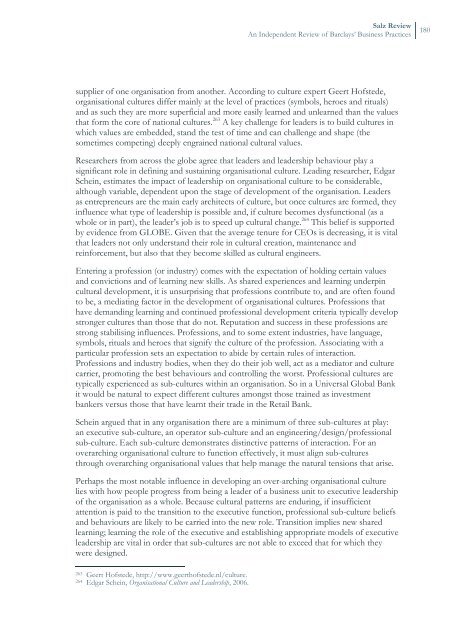Salz Review - Wall Street Journal
Salz Review - Wall Street Journal
Salz Review - Wall Street Journal
You also want an ePaper? Increase the reach of your titles
YUMPU automatically turns print PDFs into web optimized ePapers that Google loves.
<strong>Salz</strong> <strong>Review</strong><br />
An Independent <strong>Review</strong> of Barclays’ Business Practices<br />
180<br />
supplier of one organisation from another. According to culture expert Geert Hofstede,<br />
organisational cultures differ mainly at the level of practices (symbols, heroes and rituals)<br />
and as such they are more superficial and more easily learned and unlearned than the values<br />
that form the core of national cultures. 263 A key challenge for leaders is to build cultures in<br />
which values are embedded, stand the test of time and can challenge and shape (the<br />
sometimes competing) deeply engrained national cultural values.<br />
Researchers from across the globe agree that leaders and leadership behaviour play a<br />
significant role in defining and sustaining organisational culture. Leading researcher, Edgar<br />
Schein, estimates the impact of leadership on organisational culture to be considerable,<br />
although variable, dependent upon the stage of development of the organisation. Leaders<br />
as entrepreneurs are the main early architects of culture, but once cultures are formed, they<br />
influence what type of leadership is possible and, if culture becomes dysfunctional (as a<br />
whole or in part), the leader’s job is to speed up cultural change. 264 This belief is supported<br />
by evidence from GLOBE. Given that the average tenure for CEOs is decreasing, it is vital<br />
that leaders not only understand their role in cultural creation, maintenance and<br />
reinforcement, but also that they become skilled as cultural engineers.<br />
Entering a profession (or industry) comes with the expectation of holding certain values<br />
and convictions and of learning new skills. As shared experiences and learning underpin<br />
cultural development, it is unsurprising that professions contribute to, and are often found<br />
to be, a mediating factor in the development of organisational cultures. Professions that<br />
have demanding learning and continued professional development criteria typically develop<br />
stronger cultures than those that do not. Reputation and success in these professions are<br />
strong stabilising influences. Professions, and to some extent industries, have language,<br />
symbols, rituals and heroes that signify the culture of the profession. Associating with a<br />
particular profession sets an expectation to abide by certain rules of interaction.<br />
Professions and industry bodies, when they do their job well, act as a mediator and culture<br />
carrier, promoting the best behaviours and controlling the worst. Professional cultures are<br />
typically experienced as sub-cultures within an organisation. So in a Universal Global Bank<br />
it would be natural to expect different cultures amongst those trained as investment<br />
bankers versus those that have learnt their trade in the Retail Bank.<br />
Schein argued that in any organisation there are a minimum of three sub-cultures at play:<br />
an executive sub-culture, an operator sub-culture and an engineering/design/professional<br />
sub-culture. Each sub-culture demonstrates distinctive patterns of interaction. For an<br />
overarching organisational culture to function effectively, it must align sub-cultures<br />
through overarching organisational values that help manage the natural tensions that arise.<br />
Perhaps the most notable influence in developing an over-arching organisational culture<br />
lies with how people progress from being a leader of a business unit to executive leadership<br />
of the organisation as a whole. Because cultural patterns are enduring, if insufficient<br />
attention is paid to the transition to the executive function, professional sub-culture beliefs<br />
and behaviours are likely to be carried into the new role. Transition implies new shared<br />
learning; learning the role of the executive and establishing appropriate models of executive<br />
leadership are vital in order that sub-cultures are not able to exceed that for which they<br />
were designed.<br />
263 Geert Hofstede, http://www.geerthofstede.nl/culture.<br />
264 Edgar Schein, Organisational Culture and Leadership, 2006.
















